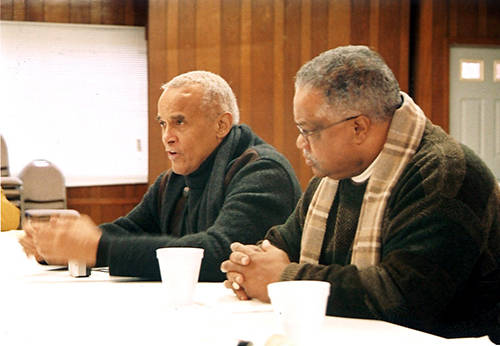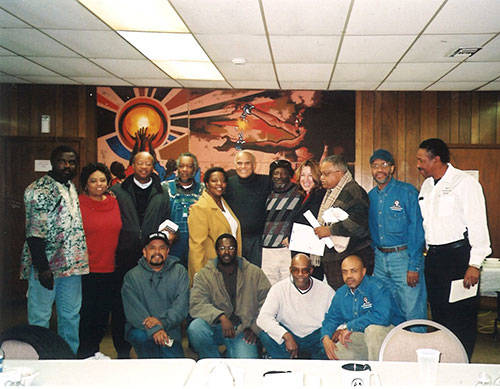 On February 22, with more than 40 million people watching, Harry Belafonte will be awarded an honorary Oscar and the Jean Hersholt Award during the 87th Academy Awards in Hollywood. The 87-year-old singer, actor and civil rights activist is best-known for his lifetime contributions to humanitarian causes and social change. But David Thompson, president of the Twin Pines Cooperatives Foundation and a 2010 inductee into the Cooperative Hall of Fame, knows Belafonte for being a housing co-op organizer and lifetime supporter of the cooperative movement. An edited excerpt from Thompson’s upcoming book, “The Role of Cooperatives in the Civil Rights Movement,” follows:
On February 22, with more than 40 million people watching, Harry Belafonte will be awarded an honorary Oscar and the Jean Hersholt Award during the 87th Academy Awards in Hollywood. The 87-year-old singer, actor and civil rights activist is best-known for his lifetime contributions to humanitarian causes and social change. But David Thompson, president of the Twin Pines Cooperatives Foundation and a 2010 inductee into the Cooperative Hall of Fame, knows Belafonte for being a housing co-op organizer and lifetime supporter of the cooperative movement. An edited excerpt from Thompson’s upcoming book, “The Role of Cooperatives in the Civil Rights Movement,” follows:
By 1958, Harry Belafonte had become a famous name all over the world. In 1953, he recorded “Matilda,” his signature song and best-selling single. By 1958, he had eight albums to his name and his 1956 Calypso Album—featuring “Jamaica Farewell” and the “Banana Boat Song (Day O)”—topped the charts for 31 weeks. Calypso was the first album to sell more than one million copies. Belafonte had also become a screen symbol in the 1954 movie “Carmen Jones,” followed by his impactful inter-racial 1957 movie “Island in the Sun” with Joan Fontaine.
At the height of his popularity, Belafonte could pack concert halls worldwide and movie theaters in every town. But he couldn’t rent or own an apartment in midtown Manhattan.
Belafonte recounts in his book, “My Song,” that he “ran into a color barrier so blatant and infuriating—in Manhattan, of all places,” that it would require “all the money and celebrity I could throw at it.”
“Now that we were a family, [my wife] Julie and I had started searching for a larger apartment. Our first thought was to rent on the Upper East Side, but every broker we contacted seemed to blanch when we walked in. The message conveyed, either implicitly or overtly, was that we’d be happier in some other neighborhood.”
Belafonte got the message “loud and clear,” he wrote, and responded by calling a press conference to announce he’d filed a formal complaint with the city. Eleanor Roosevelt was among those who read the news.
In her nationally-syndicated column, “My Day,” the former First Lady wrote, “I am sure that every New Yorker was shocked the other day to read that Harry Belafonte and his charming wife and baby were finding it practically impossible to get an apartment in New York City, except in what might be considered segregated areas or in a hotel.”
 In that same 1958 column, Roosevelt highlighted housing cooperatives as one of the solutions to segregation. “Some private builders who are planning and constructing co-op apartments are particularly interested in seeing that there is no discrimination in any project where they have invested their money,” she wrote.
In that same 1958 column, Roosevelt highlighted housing cooperatives as one of the solutions to segregation. “Some private builders who are planning and constructing co-op apartments are particularly interested in seeing that there is no discrimination in any project where they have invested their money,” she wrote.
Roosevelt concluded her column, “I can think of nothing I would enjoy more than having Mr. and Mrs. Belafonte as my neighbors.” She even offered to share her own large apartment with Belafonte and his family.
A few months later, Belafonte and his wife found a four-bedroom apartment at 300 West End Avenue, but when they tried to rent it, the apartment was suddenly “unavailable.”
When Belafonte sent a white friend—his publicist, Mike Merrick—to rent the apartment, the lease was easily conferred and passed on to Belafonte. Within hours of moving in, however, the building manager realized he was renting to an African American family and asked Belafonte to pack up and leave. He refused.
Instead, Belafonte and others set up anonymous companies that submitted separate bids to buy the building, and the absentee billionaire owner accepted the highest bid.
“The whole concept of co-ops was just beginning to take hold. What we were proposing would soon become a trend. We would buy the building outright from its owner, then try to sell as many of the apartments as possible to the tenants who lived in them. Any tenant who preferred to keep renting could,” Belafonte wrote.
Belafonte put up most of the funds. The other tenants purchased shares and the housing co-op was created. As the remaining rental units turned over, Belafonte encouraged his friends to join the co-op. Lena Horne, Belafonte’s singing partner on the album Porgy and Bess, was one of the first to join.
“We didn’t just invite black friends, though. Our goal was integration, not ‘reverse segregation,’” Belafonte wrote. Eventually, 300 West End Avenue became known as “Harry’s Building,” despite the fact it was co-owned.
In March of 1959, the co-op apartment welcomed two of its first guests, Belafonte’s longtime confidant Martin Luther King Jr. and Coretta Scott King.
“Martin would come to think of [the co-op apartment] as his ‘home away from home,’ staying with us on many of his New York trips. He brought with him two or three of his closest advisors, and by the mid-60s, the apartment was one of the [Civil Rights] movement’s New York headquarters,” Belafonte wrote.
Belafonte called that co-op home for the next almost 50 years. Civil rights leaders, celebrities and public figures would gather there for meetings and dinners. Famous visitors included Eleanor Roosevelt and later Senator John Kennedy, who stopped by to seek Belafonte’s support for his 1960 presidential run.
 The co-op also hosted fundraising receptions. At one such fundraiser in March of 1963, Belafonte raised $50,000 to cover bail for imprisoned civil rights activists, among them Martin Luther King Jr., who was writing his now-famous “Letter from Birmingham Jail.”
The co-op also hosted fundraising receptions. At one such fundraiser in March of 1963, Belafonte raised $50,000 to cover bail for imprisoned civil rights activists, among them Martin Luther King Jr., who was writing his now-famous “Letter from Birmingham Jail.”
When drafting the controversial anti-war speech King would deliver at Riverside Church in New York City in April of 1967, he was staying with Belafonte. “When Martin headed back down to Atlanta,” Belafonte wrote, “I saw that he’d left [discarded] legal-pad pages in his guest-room waste basket. I retrieved them and framed them, and for years they graced what I called my ‘Civil Rights Wall’—a hallway of photographs, letters and other memorabilia from the movement.”
During this time Belafonte also became a fervent supporter of the Federation of Southern Cooperatives. In 2003, the Federation marked Belafonte’s contributions by awarding him their highest honor, the Estelle Witherspoon Award, at their Annual Awards Banquet in Birmingham, Alabama. The award is named after the woman who led efforts to unite the Gee’s Bend quilters into the nationally famous Quilting Bee Co-op in Alberta, Alabama.
Today, at age 87, Belafonte continues to work with the Federation on current issues.
Ralph Paige, executive director of the Federation of Southern Cooperatives, has known Harry Belafonte since the Civil Rights era of the 1960s. “We could not buy the support that Harry has given the Federation over the years,” Paige said. “Without his backing there are so many things that the Federation could not have achieved. I still call him a lot and in all these years he has never turned us down.”
Paige believes that Belafonte supports the Federation and cooperatives because, “we use cooperatives to focus on the daily task of building community and social networks. Belafonte has often funded and participated in Federation events that were gatherings of all races to look for ways to work together in the rural South. Belafonte has stuck with the Federation through thick and thin,” he said.
Belafonte’s award was pre-filmed on November 9, 2014. During the ceremony, Belafonte spoke eloquently about his desire for social change. As Belafonte is honored during the 87th Academy Awards, it’s my hope that cooperators everywhere remember that he deserves our gratitude for continuously supporting co-ops as a solution during his very full life of social activism.


